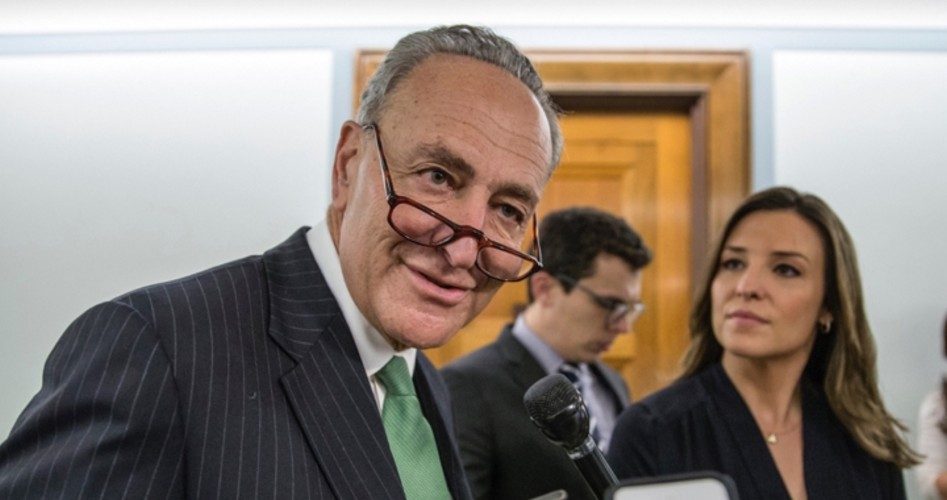
On Tuesday, the U.S. Senate voted in favor of allowing the families of 9/11 victims to sue Saudi Arabia for its potential involvement in the terrorist attacks, despite threats of economic retaliation from the Saudi government. Though the legislation has bipartisan support, it faces threat of a veto from President Obama.
The bill, Justice Against Sponsors of Terrorism Act, was sponsored by Democratic Senator Charles Schumer of New York (shown) and Republican Senator John Cornyn of Texas, and would allow the families of 9/11 to sue (in a U.S. court) elements of the Saudi government that may have played a role in the terrorist attacks. Schumer declared, “Today the Senate has spoken loudly and unanimously that the families of the victims of terror attacks should be able to hold the perpetrators even if it’s a country, a nation, accountable. It will serve as a deterrent and warning to any other nation who assists in terror attacks against America.”
According to the New York Times, the 9/11 victims’ families have claimed that the Saudi royal family is responsible for financially supporting terrorism for over a decade and have attempted to file lawsuits against them, but a 1976 law that provides foreign nations with immunity from lawsuits in American courts has blocked the suits.
The Senate bill makes an exception to that law “if foreign countries are found culpable for terrorist attacks that kill American citizens within the United States,” the Times reports.
Senator Schumer indicates that the bill’s intent is to seek justice for the victims’ families.
“For the sake of the families, I want to make clear beyond the shadow of a doubt that every entity, including foreign states, will be held accountable if they are found to be sponsors of the heinous act of 9/11,” he said shortly before the bill’s passage.
“If the Saudis did not participate in this terrorism, they have nothing to fear about going to court,” he said. “If they did, they should be held accountable.”
The timing of the legislation corresponds with calls to declassify a 28-page portion of a 2002 congressional investigation of the 9/11 attacks that connects Saudi government officials and Saudi citizens living in the U.S. to the attacks.
A document released by the National Archives provides some insight into what the classified 28 pages reveal. The document includes memos written by staff of the 9/11 commission that connects the hijackers to Saudis living in the United States.
Despite those potential connections, the 9/11 Commission ultimately concluded that there was “no evidence” that the Saudi government, or individual Saudi officials, funded the 9/11 attacks.
Thomas Kean and Lee Hamilton, co-chairmen of the 9/11 commission, said last month that the classified 28 pages “were based almost entirely on raw, unvetted material that came to the F.B.I.” and were ultimately found to be inconclusive.
Still, BBC News reports that an inmate in U.S. custody, Zacarias Moussaoui, said last year that a Saudi prince had helped to finance the terror attacks. The Saudi government dismissed these claims as accusations from a “deranged criminal.”
In response to the legislation, the Saudi government has threatened to sell off $750 billion in Treasury securities and other assets if the legislation passes.
“We said that a law like this is going to cause investor confidence to shrink,” Saudi Foreign Minister Ahmed Al-Jubeir stated at a conference in Geneva. “Not just for Saudi Arabia, but for everybody.”
Al-Jubeir contends that his objection to the bill rests on principle. “What [Congress is] doing is stripping the principle of sovereign immunities which would turn the world for international law into the law of the jungle,” he said in a statement on Tuesday.
But Schumer contends that the threats are empty, saying, “It will hurt them a lot more than it hurts us.”
Still, the measure is likely to be vetoed by President Obama. White House Press Secretary Josh Earnest told reporters that such legislation has the potential to create “unintended consequences,” and would “change longstanding international law regarding sovereign immunity and the president continues to harbor serious concerns this legislation would make the U.S. vulnerable in other court systems around the world.”
Schumer contends that the White House concerns are unfounded. He went so far as to indicate that the Senate could override the president’s veto.
“I think we easily get the two-thirds override if the president should veto,” he said.
In an effort to appease the White House, the sponsors included a provision that enables the attorney general to put individual court cases on hold as long as the administration had evidence that it was engaged in negotiations with the government to resolve the claims. Schumer has clarified that in order to qualify for this provision, specific details regarding the negotiations would need to be provided, as well as a deadline for the resolution to be reached.
Earnest told reporters that White House officials are interested in discussing alternatives to this legislation with Congress.
The bill is now making its way through the House, with a hearing scheduled in the House Judiciary Committee.
Some members of the House have voiced concerns about the legislation.
“I think we need to look at it,” House Speaker Paul Ryan told reporters. “I think we need to review it to make sure we are not making mistakes with our allies and we’re not catching people in this that shouldn’t be caught up in this.”
James Kreindler, a trial lawyer who represents 9/11 families, believes the bill will pass the House and become law.
“It would be crazy for Obama to veto bipartisan legislation [which would] open [U.S.] courts to victims of the worst terrorist attack in U.S. history,” Kreindler said.
Photo: AP Images



